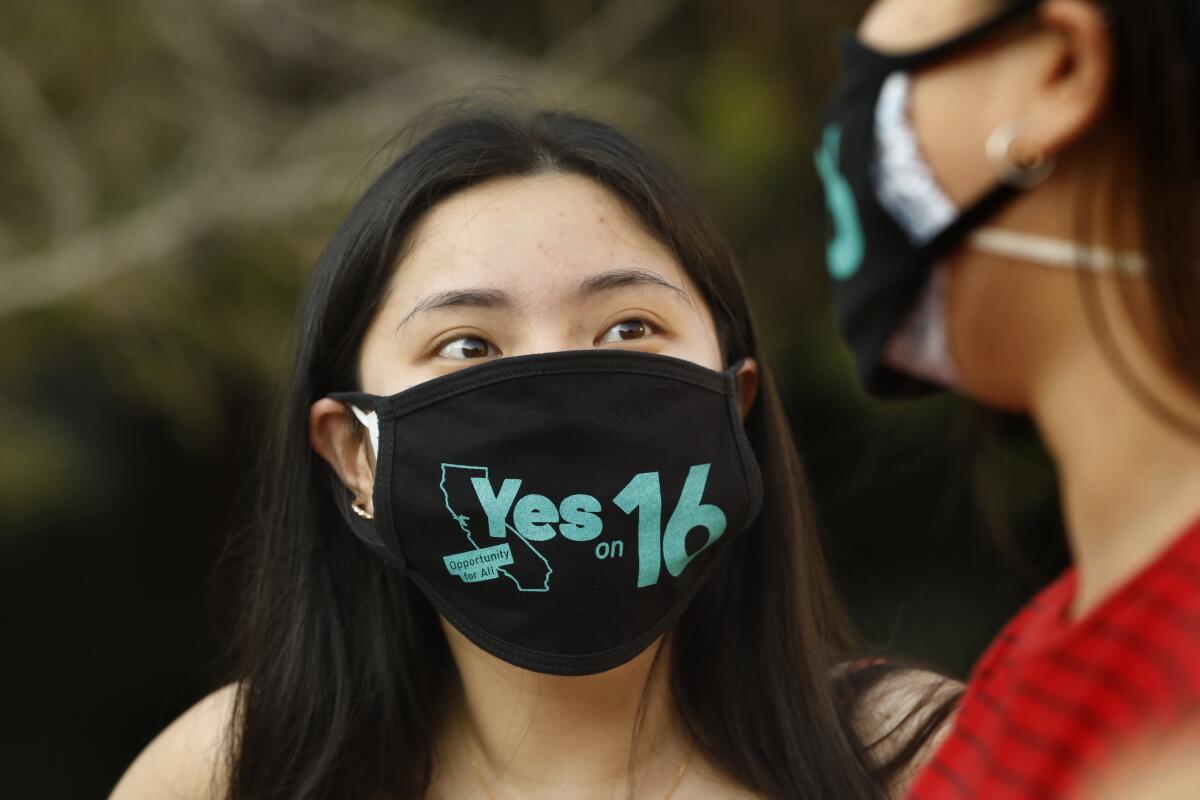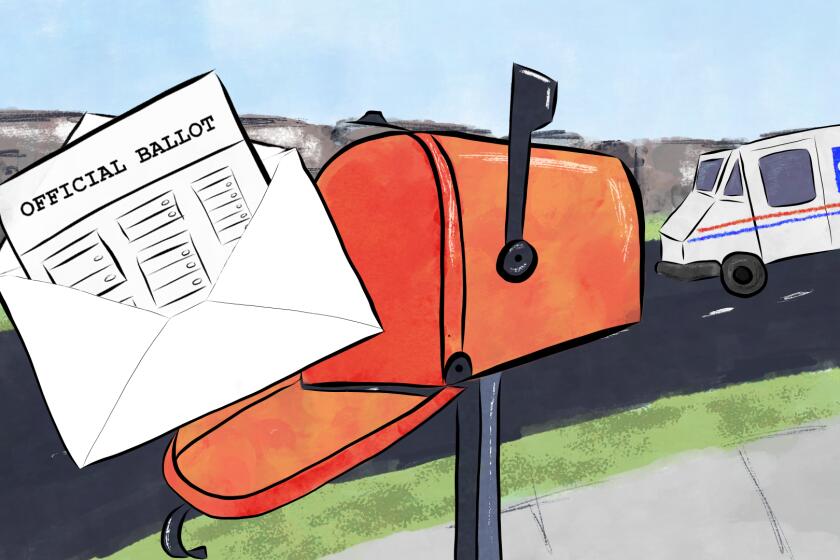Affirmative action divides Asian Americans, UC’s largest overrepresented student group

- Share via
Angela Li and Vivrd Prasanna have achieved the pinnacle of a public university education — she a senior at UCLA, he a freshman at UC Berkeley. Both are children of immigrants, with Li’s parents from China and Prasanna’s from India.
They share values of hard work and high expectations. Li checked out school textbooks during the summer to get a head start on fall classes and in high school took test prep courses with money her working-class parents saved by giving up family vacations. Prasanna took college classes in data science as a high school student.
But when it comes to Proposition 16, the Tuesday ballot measure that would once again allow affirmative action in public education, contracting and hiring, the two UC students and their families sharply diverge.
Li supports the measure as a way to expand diversity in education — but her parents oppose it, suspicious that it will limit the enrollment of Asian Americans. Prasanna opposes it as the wrong way to deal with root causes of educational inequity, while his parents are torn over their twin desires to stand for civil rights and to ensure equal opportunity for their community.
Their diverse views reflect the complexity of the affirmative action issue among Asian Americans, who represent more than 50 ethnic subgroups with varying politics, histories in the United States and levels of income, education and English language ability. Those differences play out in their views of Proposition 16 and concerns about their place at the University of California.

Asian Americans predominate at UC and are significantly overrepresented — making up 40.3% of in-state freshmen last year compared with their 19.9% share among California high school graduates eligible for UC admission. By comparison, Latinos made up 31.5% of UC freshmen and 44.7% of that qualified pool; whites were 20.6% at UC and 27% of eligible students and Black freshmen were 4.5% at UC and 4.2% of those who met systemwide admission standards.
As a result, some Asian Americans are nervous that they would be squeezed out to make room for others if Proposition 16 passes and allows preferential admissions on the basis of race, ethnicity and sex. Even back during the 1980s, when affirmative action was legal in California, Asian Americans were overrepresented at UCLA and UC Berkeley and fought admission policies they believed sought to limit their enrollment at those campuses.
After Proposition 209 banned race-based preferential treatment, the gap between their high admission rates and those of other ethnic groups widened with their rigorous high school course loads, high GPAs and competitive test scores.
It’s not clear what would happen if affirmative action were restored. UC regents support restoring affirmative action, saying it’s needed to fully diversify campuses but recently voted to ban quotas, which the U.S. Supreme Court already has nixed. Board Chairman John A. Pérez has said that race would become one of more than a dozen factors currently evaluated in applications.
At UC Berkeley, Chancellor Carol Christ has said she favors expanding capacity to make more room for everyone.
UCLA Vice Provost for Enrollment Management Youlonda Copeland-Morgan told The Times last week that she didn’t know if Asian American enrollment would decline at UCLA but that the campus would continue to focus on outreach to those from less represented communities, such as Hmong, Laotian, Vietnamese and Philippine students. Last year, UCLA offered freshman seats to eight California Hmong students compared with 1,241 Chinese Americans, who were the single largest racial or ethnic group admitted after Mexican Americans and whites, according to UC data.
Some Asian Americans try to divine the future by looking to private California colleges, which were not bound by Proposition 209’s ban on affirmative action at public campuses. They are not encouraged: the top privates enroll smaller proportions of Asian American undergraduates than the 33.5% at UC campuses, including 23% at Stanford University, 21% at USC and 16.3% at Pomona College.
But experts say the impact of Proposition 16 will probably vary among Asian American subgroups.
“You can’t paint Asian Americans with a broad brush,” said Karthick Ramakrishnan, a UC Riverside professor of public policy and political science who founded AAPIData.com, which publishes demographic data and policy research on Asian Americans and Pacific Islanders. “Some will benefit and others stand to lose.”
Overall, more Asian Americans support Proposition 16 than oppose it — 35% vs. 21% with most of the rest undecided, according to a September survey of Asian American voters in California by AAPI Data and two other Asian American and Pacific Islander organizations.
But intriguing differences emerged in the survey.
Ethnic Chinese — who make up a maximum of 38% of Asian American students admitted by UC, by far the largest subgroup — opposed the measure, 37% to 30%. Among ethnic Philippine, Vietnamese, Japanese and Korean voters, support was greater than opposition but topped out at 38% with large numbers undecided at the time.
Voters of Indian descent were by far the most supportive of the affirmative action ballot measure, 58% vs. 17%. The strong support among Indian Americans is all the more striking because their share among Asian American California freshmen has surged from 7.8% in 1996 to 17.4% in 2019.
Indian Americans had one of the highest admission rates among their California ethnic Asian peers last fall, about 79%. And South Asians, who include those of Indian, Pakistani, Bangladeshi and Sri Lankan descent, made up the second-largest Asian American subgroup after ethnic Chinese.
If any subgroup numbers decline under Proposition 16, Ramakrishnan said, it would probably be ethnic Chinese and Indian students because of their size. Nonetheless, many Indian Americans support Proposition 16 — and other progressive political causes — reflecting both homeland and domestic realities, he said. Their families have adapted to affirmative action in India, which is used to grant preferential access to many colleges based on caste, and are sensitive to race-based bias and discrimination as a darker-skinned minority in the United States, Ramakrishnan said.
Aidan Arasasingham, a South Asian high achiever and the son of Sri Lankan immigrants, is a UCLA senior in global studies and president of the UC Student Assn. He supports Proposition 16, as do the UC Student Assn. and most of the UCLA Asian Pacific Coalition’s 19 member groups. Arasasingham said all students, Asian Americans included, will be enriched by a more diverse campus — a point affirmed by research.
One synthesis of more than 500 studies found that greater cross-racial interaction is associated with lower levels of prejudice; other researchers have found that diversity spurs growth in cognitive skills, academic engagement and innovative problem solving, according to an October analysis by William C. Kidder for the Civil Rights Project at UCLA.
“Students ... across campuses really strongly believe that diversity is an essential part of our experience,” Arasasingham said. “When we graduate, we’re going to be in a world where we’re engaging and interacting with communities that don’t look like our own and it’s setting us up for failure if we don’t have an understanding of them.”
Some Asian Americans, however, say their personal experiences have soured them on affirmative action.
Ling Kong, a Silicon Valley design engineer and mother of two school-age children, said her ethnic Chinese family faced bias in their native Malaysia because preferential college access is given to Malays and indigenous groups. Her failure to get into local colleges there led her to study electrical engineering at Iowa and Arizona state universities.
“I don’t want my kids to be treated differently on the basis of race,” she said.
Kong, who describes herself as a lifelong Democrat supportive of diversity and inclusion, said she opposes Proposition 16 because she doesn’t believe it will solve educational inequity. Her experience on the Milpitas Unified School District’s community advisory board and her children’s school site council has shown her that affordable preschools and quality K-12 schools with adequate funding in all neighborhoods are needed, she said.
“Prop. 16 doesn’t address any of this,” she said. “It’s just a quick fix and it won’t really help close the achievement gap or solve systemic inequity.”
For state Assemblyman Al Muratsuchi (D-Torrance) , the debate sparks a sense of deja vu. As a UC Berkeley student in the 1980s, he joined protests over changes in campus admission policies, such as increasing the weight of verbal over math skills, that were seen by many Asian Americans as efforts to limit their surging enrollment. Reviews of such allegations at Berkeley and UCLA by faculty, state and federal authorities generally found that some admission policies had hurt Asian Americans but were not intentionally discriminatory.
Muratsuchi supports Proposition 16 but says he will watch to make sure that a de facto ceiling is not placed on Asian American enrollment if it passes. In what is supposed to be a race-blind environment today, he said, UC data suggest different standards are used for Asian Americans, who were admitted into the fall 2020 California freshman class with SAT scores up to 310 points higher than those for underrepresented minority students and up to 80 points higher than those for whites. UC, however, is eliminating the use of standardized test scores in admissions decisions.
“While I support the concept of affirmative action, we need to make sure there is transparency and accountability in how it is implemented so this complicated racial balancing act doesn’t result in discriminating against any racial groups,” he said.
More to Read
Sign up for Essential California
The most important California stories and recommendations in your inbox every morning.
You may occasionally receive promotional content from the Los Angeles Times.













